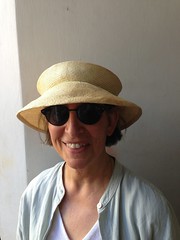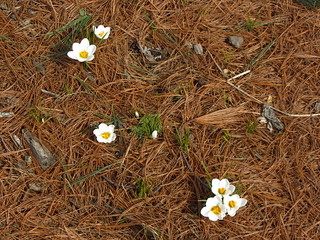
I'm a writer, publishing both as SJ Rozan and, with Carlos Dews, as Sam Cabot. (I'm Sam, he's Cabot.) Here you can find links to my almost-daily blog posts, including the Saturday haiku I've been doing for years. BUT the blog itself has moved to my website. If you go on over there you can subscribe and you'll never miss a post. (Miss a post! A scary thought!) Also, I'll be teaching a writing workshop in Italy this summer -- come join us!
Read/Post Comments (3)

Don't get too close with the backside of an animal
The above, the admonition from Haji, our local guide, before he led us into the Sunday animal bazaar in Kashgar. It seems like good advice in a general sort of way, and here to be taken literally. From all directions, men drive donkeys, sheep, goats, mules, cattle, and horses into a broad open field. They either come trotting along the roads, or on the backs of carts or trucks, to be sold for meat, for breeding, for work, for riding. The market's a big social event, full of talk, gestures, braying and dust. In fact, you really need to go in the morning if all you want to do is see, not buy, because by afternoon the thick, swirling dust obscures everything more than ten feet away. I saw a guy in the center of a group of men, gesturing with a handful of bills and holding the bridle of a donkey in his other hand, trying to convince the donkey's owner the cash he was offering was good enough. The donkey apparently thought so; he reached over and nibbled on it. The bearded men in their embroidered caps stared, and then a good laugh was had by all. At the far end, the field's pretty empty; that's where you gallop a horse you're thinking of buying. They don't provide you a saddle or even a blanket, though, so if you didn't bring one, it's just you and the bony back of a horse. So the test drives don't last long.
It's a man's world, the animal market. Lots of little boys running around, and women almost nowhere but cooking at the makeshift food wagons. These are largely farming families from the far outskirts of Kashgar, traditional in their ways. It brings shame on the family, according to Haji, for young women to go out to the bazaar. I mention this because, as exciting as it is for us to see this bazaar, little changed for 2,000 years, the reality is bigger than the excitement, the colors, the smells, the new sounds and sights. The horses are skinny, the sheep destined for the soup pot, and the girls locked up at home.
It's a man's world, the animal market. Lots of little boys running around, and women almost nowhere but cooking at the makeshift food wagons. These are largely farming families from the far outskirts of Kashgar, traditional in their ways. It brings shame on the family, according to Haji, for young women to go out to the bazaar. I mention this because, as exciting as it is for us to see this bazaar, little changed for 2,000 years, the reality is bigger than the excitement, the colors, the smells, the new sounds and sights. The horses are skinny, the sheep destined for the soup pot, and the girls locked up at home.
Read/Post Comments (3)
Previous Entry :: Next Entry
Back to Top